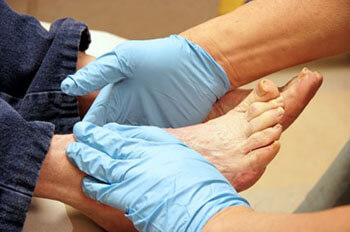
Diabetes can lead to a variety of serious foot problems, primarily caused by nerve damage and poor circulation. Without proper care, these issues can escalate into ulcers, infections, and even amputation. If you’re experiencing any signs of diabetic foot complications, don’t wait—contact Advanced Foot and Ankle Center today to schedule an evaluation and protect your foot health.
Diabetes-Related Foot Conditions We Treat
Diabetes-related foot conditions can severely impact foot health, leading to a range of complications. At Advanced Foot and Ankle Centers, our specialists treat diabetes-related foot ulcers and other related injuries that are common and serious complications caused by diabetes.
Diabetes-Related Foot Ulcers
A diabetes-related foot ulcer is an open sore or wound on the foot of a person with diabetes. These ulcers mostly occur at the bottom of the foot and can lead to severe infections and even amputation if left untreated.
Symptoms and Causes
Diabetes can lead to nerve damage and poor circulation, both of which can affect wound healing and increase the risk of ulcers. There are several symptoms associated with diabetes-related foot ulcers, including:
Visible symptoms
- Sores or wounds: Open sores or wounds on the foot, which can often be found on the toes, balls of the feet, or heels.
- Redness and swelling: The area around the ulcer may become red, warm, and swollen, indicating an infection.
- Drainage: Discharge of pus or blood from the ulcer.
- Skin changes: Discoloration of the skin around the ulcer, which can range from red, brown, purple, or greenish-black.
Other symptoms
- Unpleasant odor: An unusual or foul odor coming from the foot.
- Pain: Discomfort or pain, especially if the ulcer is infected.
- Fever and chills: In severe cases, individuals may experience fever and chills, indicating systemic infection.
Common Complications of Diabetes-Related Foot Conditions
Monitoring foot health is crucial to minimize the risk of complications from diabetes-related foot conditions. We offer check-ups and other maintenance services to help patients avoid complications. Common complications include:
- Neuropathy: Nerve damage is a common complication, leading to numbness, tingling, pain, or loss of sensation in the feet.
- Poor circulation: Reduced blood flow to the feet can impair healing and increase the risk of infection.
- Skin and nails: Dry, cracked skin, calluses, ingrown toenails, and fungal infections are common complications in people with diabetes.
- Foot deformities: Experiencing muscle weakness and nerve damage can lead to deformities like hammertoe and bunions.
Treatment Options for Diabetic Foot Conditions
Our treatment options for diabetic foot conditions focus on preventing and managing complications, such as ulcers and infections.
The Importance of Regular Check-Ups
As part of our Diabetic Foot Treatment, we recommend that patients get regular check-ups. Check-ups are essential for managing diabetic foot injuries and preventing complications. Regular check-ups can help detect common problems early, such as ulcers, infections, and nerve damage.
Infection Prevention
During a regular check-up, we will perform routine foot inspections and offer prompt treatment if there are early signs of infection. These check-ups are critical for preventing infections.
Off-Loading
If necessary, one of our physicians can reduce and redistribute pressure on a wound to promote healing and prevent further tissue damage.
Applying Medication and Dressings
Depending on the severity of the injury, one of our physicians or staff members will systematically apply medications and dressings to prevent complications.
Surgical Options
As part of our comprehensive diabetic foot treatment services, we offer surgical options. Sometimes, surgery is necessary to preserve your health after a diabetic foot injury. Your physician will determine if this is required during your visit and help you plan for surgery as well as schedule any appointments necessary for your health. Your doctor can explain surgical options for diabetic foot treatment, focusing on addressing complications like ulcers and infections.
How You Can Manage Diabetic Foot Conditions
Managing Blood Glucose
Managing blood glucose is vital for preventing and mitigating diabetic foot conditions. High blood sugar can damage nerves and blood vessels, leading to diabetic neuropathy and poor circulation.
Simple Hygiene
Good foot hygiene can reduce the risk of infections, prevent dry skin and cracking, maintain healthy skin, and allow for early detection of problems.
Clovis, California's Trusted Podiatrists
At Advanced Foot and Ankle Centers, we offer the most advanced wound care treatment options in a caring and compassionate atmosphere. Our priority is delivering exceptional podiatric care to our community while using the latest technology to achieve the best results.
Collaborative Care That Makes a Difference
We have a dedicated team of specialists committed to providing personalized treatment plans tailored to each patient's needs. We believe in a patient-centered approach to care and ensure that we offer our patients a variety of podiatric services, from routine foot care to advanced surgical procedures, to help patients live and feel better.
Schedule an Appointment Today
If you're living with a diabetic foot condition and looking for relief, it's time for your personalized treatment plan. Promptly addressing diabetic foot conditions is crucial to prevent a range of complications that can significantly impact quality of life. Schedule your appointment today to manage your diabetic foot condition.
